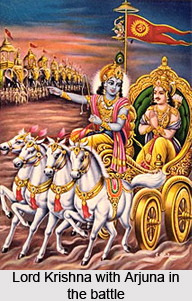Ashvamedhika Parva is the fourteenth Parva among the eighteen Parvas of the Mahabharata. It consists of two sub-parvas from among the hundred sub-parvas of the great Hindu epic of Mahabharata. This Parva or episode is also known as the `Book of the Horse Sacrifice`. This Parva consists of the narration about the royal ceremony of the Ashvamedha or the `Horse sacrifice` which was conducted by Yudhisthir with the advice of Lord Krishna. Apart from the Ashvamedha and the world conquest of Arjuna, this Parva also narrates the Anugita as it was told by Krishna to Arjuna. After the great battle at Kurukshetra was over, Arjuna asked Krishna to repeat what he told to Arjuna in the battle field and after hearing which he made up his mind to fight against his own people. Thus resulted the reply of Krishna which was called Anugita and the same is mentioned in the Ashvamedhika Parva.

This Parva is included within the concluding portions of the Mahabharata and is distinguished for various reasons. The first part of the episode contains a long interposed section of Upanishadic material, which is called the Anugita. The Anugita section covers a large portion of this Parva where Arjuna asked Lord Krishna to repeat his battlefield discourse. Anugita is the story of Utanka, the disciple of Lord Krishna who underwent a journey by getting in touch with a cannibal king, magic earrings and a voyage to the underworld. It is found that the Ashvamedhika Parva is a separate metaphysical treatise probably composed at a very later date than the main narrative. It is the story of the famous Horse Sacrifice of Yudhisthir, which formed the primary narrative of the great epic. The Horse Sacrifice is an expiatory rite of matchless extravagance. In this episode there is a detailed explanation of the performance of the Horse Sacrifice by Yudhisthir.
After the coronation of Yudhisthir to the throne of Hastinapur and after the death of the great Bhishma, Lord Krishna told Yudhisthir to carry out horse sacrifice. The Horse Sacrifice demanded the mastery over all earthly Kings. Thus, Yudhisthir set free the sacrificial horse and gave the command to Arjuna to follow the horse wherever it went and also to fight against any belligerent rulers, who were not willing to accept the sovereignty of King Yudhisthir. Yudhisthir, however, also informed Arjuna not to slay any of the descendants of those who took part in the great battle at Kurukshetra. Then the sacrificial horse was followed by Arjuna as it moved through different countries.
While moving, the horse passed through the kingdom of the Trigartas and Arjuna made the rulers accept the might of Yudhisthir by his power and then the horse moved through the kingdom of Pragjyotishapura and there also Arjuna defeated the rulers of that kingdom. After the kingdom of Pragjyotishapura, the Horse moved in to the kingdom of Manipur and there Arjuna met his son Babrubahana and both father and son fought till they were exhausted. The sacrificial horse of Yudhisthir moved roamed everywhere and then it entered the kingdom of Magadha, previously ruled by Jarasandha. Arjuna defeated the grandson of Jarasandha named Meghasandhi and invited him to the Horse Sacrifice of Yudhisthir. Like this, Arjuna defeated almost all the kings and princes and after his world conquest, he returned with the sacrificial horse to Hastinapur.
Arjuna received a royal welcome in the kingdom of Hastinapur after returning from his world conquest. His elder brother Yudhisthir was filled with joy and he heard from Arjuna about his great deeds all over the world. Then the defeated kings and those who accepted the sovereignty Yudhisthir over their kingdom without any force presented themselves in the Horse Sacrifice of Yudhisthir in Hastinapur. The presence of Lord Krishna along with his elder brother Balarama in Hastinapur is also described in this Parva. The Sacrifice concluded peacefully and everyone was satisfied and with this the Ashvamedhika Parva of the great epic of Mahabharata is concluded.



















